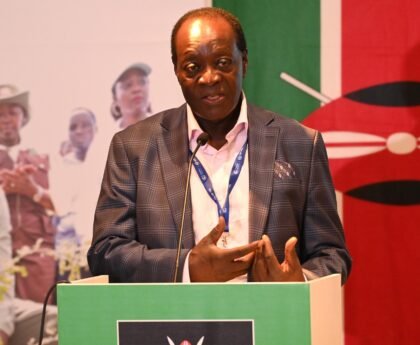A Cabinet meeting at State House, Nairobi,on Tuesday endorsed the Quality Healthcare and Patient Safety Bill, 2025, which seeks to transform the health sector by eliminating entrenched impunity and malpractices.
The Bill seeks to eliminate systemic fraud, regulatory loopholes, and conflicts of interest that have long undermined healthcare delivery and public trust.
It responds to glaring gaps that have allowed unqualified and fraudulent health facilities to be licensed and to operate.
This lack of clear standards, coupled with weak oversight and collusion among facilities, regulators, and practitioners, has left patients vulnerable and eroded accountability.
Cabinet noted that the many failures in the health system were a direct result of these weaknesses.
The new Bill establishes a unified quality assurance framework and introduces strict mandatory licensing, registration, and accreditation for all health facilities, labs, and ambulance services.
The legislation will also create a powerful Quality Healthcare and Patient Safety Authority, tasked with enforcing national care standards, overseeing implementation, and monitoring performance. The proposed law introduces quality improvement plans at the facility level, enforces patient rights, and sets clear criteria for emergency medical services, as the government aims to finally tackle the root causes of health sector corruption, protect patients, and deliver safe, effective, and high-standard healthcare that universal health coverage pledges.
To tackle these issues, the Bill introduces a quality assurance framework, mandates rigorous licensing and accreditation for all health institutions, and establishes an independent Quality Healthcare and Patient Safety Authority.
This organisation will enforce standards, protect patient rights, and enhance accountability across the sector.
In line with the government’s plan to create employment and opportunities for the youth, the Cabinet endorsed the August 2025 launch of the National Youth Opportunities Towards Advancement (NYOTA) Project, a flagship government and World Bank initiative targeting over 820,000 vulnerable
and unemployed youth, including persons with disabilities.
The programme aims to enhance employability, skills recognition, and access to decent work, and is a key pillar of the Bottom-Up Economic Transformation Agenda.
Structured into four components, NYOTA includes paid on-the-job training, entrepreneurship support, and Recognition of Prior Learning (RPL) certification.
Currently, over a million applications have been received.
The ongoing call for the On-the-Job Experience programme targets 90,000 youth for three- to six-month paid placements with employers, with monthly stipends of KSh6,000 deposited into Haba Haba savings accounts.
Applications are open from 11th July to 15th August 2025.
On conservation, the Cabinet ratified the transfer of Amboseli National Park to the County Government of Kajiado, fulfilling a presidential directive following a petition by the Maasai community.
The transfer, executed under Article 187 of the Constitution, introduces a phased co-management model in which Kajiado County assumes operational control while Kenya Wildlife Service (KWS) retains national conservation responsibilities.
The National Treasury will compensate KWS for any revenue losses, with a portion of park income still allocated to national conservation.
The move is intended to empower local communities, promote sustainable stewardship, and ensure equitable sharing of ecological and economic benefits.
The Cabinet approved the Power of Mercy Bill, 2025, which aims to clarify the implementation of Article 133 of the Constitution and modernise the presidential pardon system. The proposed law introduces a structured, accountable framework for pardons, including mechanisms for supervised early release of fully rehabilitated inmates.
The reforms are expected to ease prison overcrowding and reduce the estimated annual cost of Sh87,600 per inmate.
The Bill also enhances public safety through reintegration protocols and repeals outdated provisions under Cap. 94, reinforcing the mandate of the Power of Mercy Advisory Committee.
The Cabinet was briefed on Kenya’s readiness to host the 2024 African Nations Championship (CHAN), a historic milestone as it marks the first time in over 40 years, since the 1987 All-Africa Games, that the country is hosting a continental sporting event.
The Harambee Stars, currently in full residential training under a new technical team, are placed in Group A alongside Angola, DR Congo, Morocco, and Zambia.
The team recently received a morale boost during a visit by the President to the Moi International Sports Center, Kasarani, training facility.
The Confederation of African Football (CAF) has certified key venues, including Nyayo and Kasarani stadia, which are equipped with CCTV, Venue Operating Centres and strict access controls.
Security measures are in place, with CAF-trained police and National Youth Service stewards deployed.
Kenya is fully prepared to host a secure and successful CHAN 2024.




